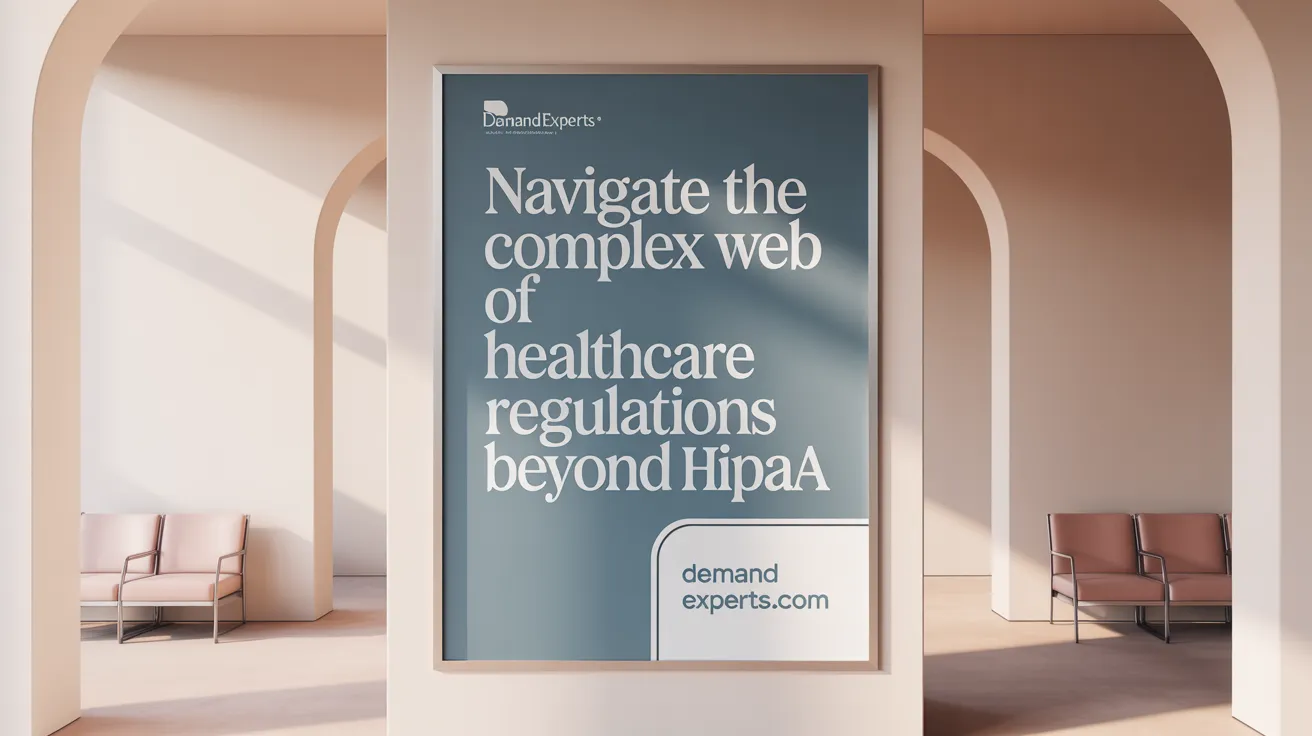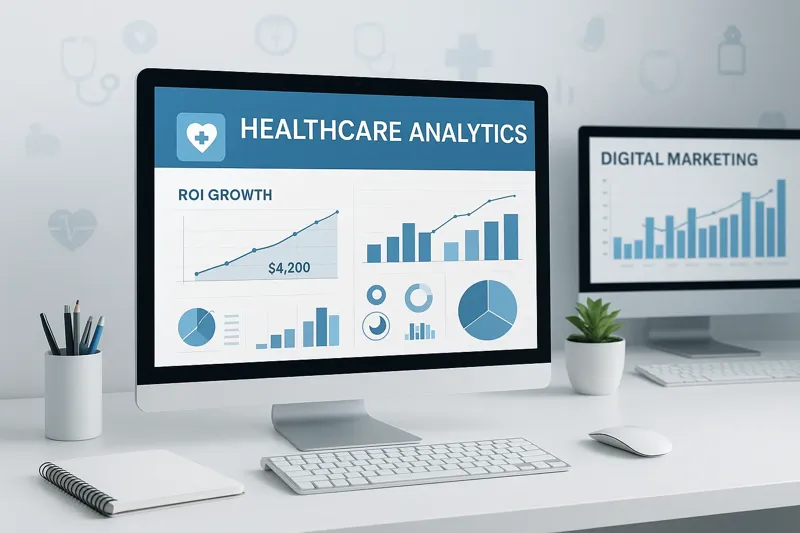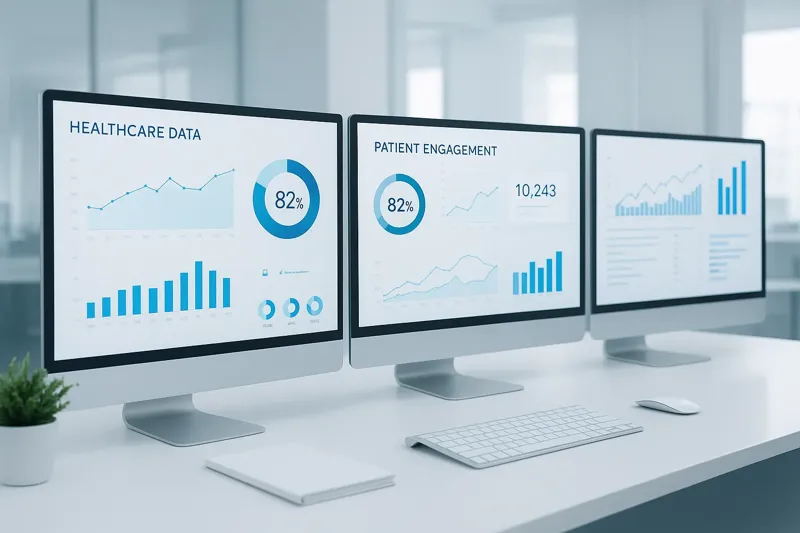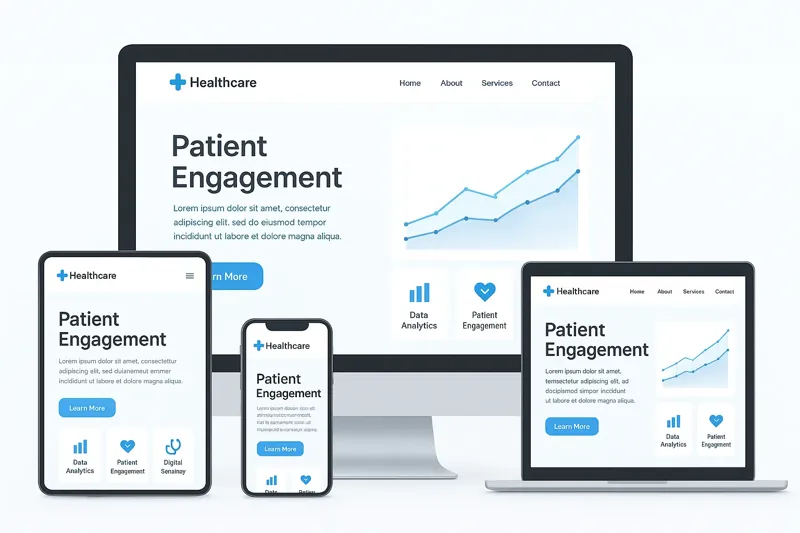The Importance of Compliance in Healthcare Digital Marketing
In the evolving realm of healthcare marketing, the stakes are higher than ever. Digital marketers specializing in healthcare must not only harness innovative tools to engage patients but also rigorously comply with a stringent regulatory framework designed to protect protected health information (PHI) and maintain patient trust. This article unpacks the essential healthcare compliance guidelines every digital marketer should follow to ensure legal adherence, data security, and ethical marketing practices.
Understanding HIPAA and Its Impact on Digital Marketing Practices

What is HIPAA and why is it critical for digital healthcare marketing?
HIPAA, the Health Insurance Portability and Accountability Act of 1996, is a federal law designed to safeguard sensitive patient health information, known as Protected Health Information (PHI). It sets national standards regulating how PHI is handled by healthcare providers and related entities, especially crucial for digital marketing activities. Since healthcare marketing often involves collecting, storing, and sharing patient-related data, HIPAA compliance guidelines for healthcare marketing ensures this information is protected against unauthorized use or disclosure. Adhering to HIPAA not only preserves patient privacy but also helps healthcare organizations avoid severe legal penalties, reputational damage, and financial loss (HIPAA violation penalties and fines).
What constitutes PHI in the context of healthcare marketing?
PHI encompasses any individually identifiable health information linked to a patient's identity. This includes medical histories, appointment dates, insurance information, or any digital identifiers connected to health services. In digital marketing, data collected through patient forms, appointment requests, contact submissions, or even behavioral data from website interactions can qualify as PHI when linked to identifiable patients. Therefore, such data must be treated with strict confidentiality and protected using appropriate security measures to comply with HIPAA regulations on protected health information.
Implications of HIPAA for digital marketing tools and platforms
HIPAA regulations require healthcare organizations to use digital marketing tools and platforms that meet stringent security and privacy standards. Many standard marketing technologies are not equipped to comply unless they sign Business Associate Agreements (BAAs) and implement robust safeguards like end-to-end email encryption and access controls. For example, email platforms must ensure encryption of PHI during transmission, and customer relationship management (CRM) systems must be HIPAA-enabled CRM systems to securely handle patient data. Additionally, healthcare marketers must avoid using PHI for ad targeting, focusing instead on non-identifiable or contextual information to remain compliant (Avoiding PHI in ad targeting). Regular compliance audits, staff training (Regular HIPAA compliance audits and staff training, and choosing platforms with verified HIPAA compliance are essential steps to mitigate risks and protect patient information in healthcare digital marketing.
Securing Patient Data: Essential Technical Measures and Vendor Compliance

What security measures must digital marketers implement to comply with HIPAA regulations on protected health information?
Digital marketers operating in healthcare must adopt stringent technical protections to ensure compliance with HIPAA regulations on protected health information. This includes the use of end-to-end email encryption for all email communications involving protected health information (PHI). Similarly, website forms collecting sensitive patient data need to utilize secure website forms with end-to-end encryption that guarantee confidentiality throughout data exchange.
Access controls and audit mechanisms play a critical role in safeguarding electronic PHI, limiting data exposure only to authorized personnel and maintaining detailed logs of information access and modifications. To avoid potential breaches, SMS is generally considered unsuitable for conveying PHI due to its lack of robust encryption capabilities, necessitating the exclusion of sensitive data from such messages.
Furthermore, healthcare marketing efforts must segment data carefully, differentiating demographic or prospect information from PHI, ensuring that only non-PHI information is processed on less secure platforms.
How critical are Business Associate Agreements (BAAs) in healthcare marketing?
Business Associate Agreements (BAAs) are indispensable in healthcare marketing when engaging external service providers. These legally binding contracts explicitly define the responsibilities and expectations for protecting PHI, ensuring that vendors uphold HIPAA-compliant safeguards.
Any third-party marketing platforms, analytics services, or communication vendors handling PHI must sign BAAs to operate lawfully and maintain compliance. Without a BAA, entities risk unauthorized PHI use or disclosure, leading to severe penalties, including substantial fines and reputational damage.
Healthcare organizations must therefore rigorously verify vendor compliance claims and demand BAAs before sharing any protected data. This agreement fosters accountability and transparency, making it a cornerstone of secure marketing initiatives.
Use of HIPAA-compliant marketing infrastructure
Deploying HIPAA-compliant marketing infrastructure is vital for protecting patient data. This infrastructure typically includes encrypted email systems like Paubox or LuxSci, secure HIPAA-enabled CRM systems, and websites equipped with SSL certificates and secure online forms for patient data.
Highly specialized analytics tools such as Matomo or Invoca conversation intelligence provide deeper insights while adhering to privacy standards by preventing PHI leakage through technologies like cookies or tracking pixels.
Choosing systems certified under recognized frameworks such as HITRUST certification and standards further assures compliance by meeting comprehensive healthcare data security requirements. Marketing teams should also employ rigorous policies, including double opt-ins and privacy policies in healthcare marketing and continuous compliance audits, to uphold data protection throughout their campaigns.
Together, these measures build a trusted, secure environment for handling sensitive patient information in digital marketing efforts, reinforcing compliance and maintaining patient confidentiality.
Strategies for Compliant Marketing Content and Patient Engagement

What consent requirements apply when using PHI in marketing?
Explicit, written patient authorization is essential before any protected health information (PHI) can be used in marketing efforts. This includes the use of patient stories, testimonials, or photographs. The authorization must be comprehensive, detailing precisely how the information will be used and ensuring the patient understands the scope of the marketing activities. Proper documentation of this consent safeguards compliance with HIPAA marketing provisions and fraud statutes and protects patient rights.
How can marketers use patient data compliantly in campaigns?
To maintain HIPAA compliance, marketers are advised to use de-identified data that strips all personal identifiers, thereby removing the information from the definition of PHI. When actual patient data is necessary, data segmentation is crucial. Separating demographic information, which is generally safe for analysis, from PHI ensures sensitive data is stored in secure environments. Additionally, marketing should avoid PHI-based targeting, focusing instead on contextual and interest-based marketing categories.
Certain patient communications, such as appointment reminders and prescription refill notifications, are usually exempt from prior authorization requirements provided these messages are strictly clinical and do not serve marketing purposes. Such communications must still comply with security measures to protect patient confidentiality, as detailed in Privacy Rule limitations on marketing.
Using patient testimonials and appointment reminders under HIPAA
When employing patient testimonials, explicit patient consent becomes the foundation of compliance. Without this, sharing testimonials or patient-generated reviews risks violating HIPAA and privacy laws. Appointment reminders and refill alerts offer a valuable communication channel that can be utilized without explicit marketing consent, as long as these are healthcare-related messages not intended for promotional purposes, a practice explained in Using patient reviews and appointment reminders compliantly.
In summary, healthcare marketers must prioritize patient privacy by obtaining explicit authorizations, leveraging de-identified data, segmenting marketing information properly, and restricting communications to compliant clinical messaging where appropriate. These strategies foster trust while enabling effective patient engagement, as supported by Steps to establish HIPAA-compliant digital marketing.
Navigating Digital Tracking and Analytics in Healthcare Marketing

What are the compliance concerns with digital tracking in healthcare marketing?
Healthcare marketing must navigate strict regulations to protect protected health information (PHI). Recent guidance from the U.S. Department of Health and Human Services (HHS) broadens the definition of PHI to include digital metadata such as IP addresses and webpage visits. This means that using tracking pixels and cookies that collect such data without patient consent or a Business Associate Agreement (BAA) can constitute a HIPAA violation.
The use of third-party tracking pixels that do not sign BAAs exposes organizations to costly legal settlements, like the $6.6 million case involving Novant Health, and erodes patient trust. Marketers must be aware that seemingly innocuous metadata is now sensitive health information under this expanded interpretation, requiring robust privacy protections.
How can healthcare marketers safely employ analytics and performance measurement?
To comply with HIPAA while leveraging digital analytics, healthcare marketers should:
- Use HIPAA-compliant analytics platforms designed to handle healthcare data securely. These platforms utilize end-to-end email encryption and maintain audit logs.
- Focus on de-identified or aggregated datasets that remove or mask PHI to minimize compliance risks.
- Avoid integrating third-party tracking pixels or tools that cannot sign a BAA.
- Employ privacy-preserving technologies such as server-side tracking and signal gateways to control data flows and prevent unauthorized disclosure.
- Build first-party data ecosystems, collecting data directly with patient consent under strict access controls and monitoring.
These strategies help maintain compliance and patient privacy while enabling valuable insights for marketing optimization.
What emerging regulations affect tracking and marketing data in healthcare?
Healthcare regulations continue evolving to address the challenges posed by digital marketing technologies. The 2022 HHS bulletin and following updates emphasize stricter control over data collection, expanding PHI definitions to digital interaction traces.
Lawsuits contesting these expansions highlight the complexity and legal risks involved. Regulatory bodies are expected to release ongoing guidance into 2025 and beyond, requiring healthcare marketers to stay vigilant and adaptable.
In response, healthcare organizations are encouraged to adopt robust compliance frameworks, such as clearly defined roles (RACI models) for marketing data governance and ongoing audits of tracking technologies to ensure responsiveness to new legal interpretations.
By prioritizing privacy and compliance in digital analytics, healthcare marketers can safely harness data-driven strategies that respect patient confidentiality and regulatory demands.
Regulatory Landscape Beyond HIPAA: Additional Laws Influencing Healthcare Marketing

Besides HIPAA, what other laws affect compliance for healthcare marketers?
Healthcare marketing must navigate several important laws beyond HIPAA. The HITECH Act intensifies rules around electronic health records and significantly raises penalties for data breaches, underscoring the importance of robust data protection strategies.
State laws like the California Consumer Privacy Act (CCPA) provide patients with rights regarding the disclosure and deletion of their health information, extending privacy protections especially within California. Meanwhile, the General Data Protection Regulation (GDPR) impacts U.S. healthcare entities that handle European patient data, mandating strict controls over personal data use.
Additionally, statutes such as the Anti-Kickback Statute and Stark Law govern financial relationships and referrals within healthcare. Although these laws focus on preventing fraud and abuse, they indirectly influence marketing tactics by restricting the promotion of services linked to inducements or conflicted referrals.
Why is it important for marketers to understand these multiple compliance frameworks?
Understanding the layered compliance requirements is critical for healthcare marketers to avoid legal violations. These overlapping federal and state regulations ensure comprehensive protection of patient data and help maintain the organization's credibility and patient trust.
Due to the complexity and evolving nature of these laws, marketing teams benefit from ongoing training and close collaboration with legal experts. This helps them adapt marketing campaigns and data handling processes to comply with the diverse legal landscape governing healthcare marketing practices.
Building a Culture of Compliance: Training, Audits, and Ethical Marketing Practices

What role does staff training play in maintaining healthcare marketing compliance?
Continuous staff education and ongoing training sessions are fundamental in upholding compliance in healthcare marketing. These efforts keep marketing teams well-informed about current laws such as HIPAA regulations on protected health information, proper handling of protected health information (PHI), and the use of secure digital marketing tools. By instilling a thorough understanding of legal requirements and data security, training reduces the risk of human error that could lead to violations. Moreover, a well-trained team supports a proactive culture of compliance, essential for protecting patient privacy and promoting ethical marketing strategies (Regular HIPAA compliance audits and staff training.
How do audits and transparency contribute to compliance?
Regular compliance audits and risk assessments are critical for identifying weaknesses or gaps in how patient data is collected, stored, and shared within marketing activities. These audits allow healthcare organizations to promptly remediate any non-compliant practices, ensuring ongoing adherence to federal and state regulations (OIG Compliance Publications). Transparency in marketing is equally important; clear privacy policies and open communication about data use foster patient trust and strengthen the organization’s reputation. Transparent, honest marketing campaigns help prevent misunderstandings or legal issues that could arise from deceptive or unclear messaging (Navigating healthcare marketing regulations).
Implementing trust-building tactics in healthcare marketing
Building trust involves ethical marketing practices such as obtaining explicit consent before using patient information, avoiding the use of PHI in ad targeting, and providing educational content rather than purely promotional materials. Organizations should engage audiences with clear privacy notices, easy opt-in/opt-out options, and secure communications platforms. These measures demonstrate respect for patient privacy and reinforce the organization’s commitment to ethical standards.
By combining thorough staff training, regular audits, and transparent marketing approaches, healthcare organizations can develop a robust compliance culture that protects patient data, upholds legal standards, and fosters lasting patient trust (Healthcare marketing compliance trends 2024, HIPAA compliance guidelines for healthcare marketing.
Leveraging Technology Responsibly: Emerging Tools and Trends in Compliant Healthcare Marketing

How can AI be used compliantly in healthcare marketing?
AI in healthcare marketing can drive automation and personalization without exposing Protected Health Information (PHI) in marketing. For example, chatbots can offer general wellness advice or direct patients to secure, HIPAA-compliant telehealth platforms without handling sensitive data. By carefully excluding PHI from AI processing and storage, marketers comply with HIPAA regulations on protected health information while enhancing patient engagement.
What technology solutions support compliance while enhancing marketing effectiveness?
Healthcare marketers leverage using encrypted email platforms for HIPAA compliance, HIPAA-enabled CRM systems, and marketing automation tools that sign Business Associate Agreements (BAAs). Consent Management Platforms (CMPs) help regulate user data tracking ethically. Additionally, privacy-first analytics platforms and conversation intelligence tools like Invoca conversation intelligence assist in uncovering marketing insights while safeguarding patient privacy.
Future-proofing marketing through privacy-first strategies
Given evolving Healthcare marketing compliance trends 2024 and heightened privacy concerns, healthcare organizations adopt privacy-first marketing approaches. This includes minimizing PHI exposure, using HIPAA-compliant analytics platforms and security features, and deploying secure, encrypted infrastructure. Collaborations among marketing, legal, and IT teams enhance data governance and support compliance while enabling personalized, effective digital engagement.
These responsible technology adoptions allow healthcare marketers to innovate and maintain trust, ensuring marketing efforts align with stringent privacy and security in healthcare marketing standards now and into the future.
Ensuring Compliance Is Integral to Healthcare Digital Marketing Success
Healthcare digital marketers must balance innovation with rigorous compliance to protect patient privacy, avoid costly penalties, and build long-lasting trust. Adhering to HIPAA guidelines, securing patient data through technical safeguards and BAAs, obtaining proper consents, and cautiously leveraging analytics and emerging technologies are critical steps. Continuous education, transparent practices, and a culture of compliance not only mitigate risk but elevate brand credibility in this highly regulated industry. By integrating these guidelines, digital marketers can drive effective healthcare campaigns that are both ethically sound and legally compliant, securing success in a dynamically evolving landscape.
The Importance of Compliance in Healthcare Digital Marketing
In the evolving realm of healthcare marketing, the stakes are higher than ever. Digital marketers specializing in healthcare must not only harness innovative tools to engage patients but also rigorously comply with a stringent regulatory framework designed to protect protected health information (PHI) and maintain patient trust. This article unpacks the essential healthcare compliance guidelines every digital marketer should follow to ensure legal adherence, data security, and ethical marketing practices.
Understanding HIPAA and Its Impact on Digital Marketing Practices

What is HIPAA and why is it critical for digital healthcare marketing?
HIPAA, the Health Insurance Portability and Accountability Act of 1996, is a federal law designed to safeguard sensitive patient health information, known as Protected Health Information (PHI). It sets national standards regulating how PHI is handled by healthcare providers and related entities, especially crucial for digital marketing activities. Since healthcare marketing often involves collecting, storing, and sharing patient-related data, HIPAA compliance guidelines for healthcare marketing ensures this information is protected against unauthorized use or disclosure. Adhering to HIPAA not only preserves patient privacy but also helps healthcare organizations avoid severe legal penalties, reputational damage, and financial loss (HIPAA violation penalties and fines).
What constitutes PHI in the context of healthcare marketing?
PHI encompasses any individually identifiable health information linked to a patient's identity. This includes medical histories, appointment dates, insurance information, or any digital identifiers connected to health services. In digital marketing, data collected through patient forms, appointment requests, contact submissions, or even behavioral data from website interactions can qualify as PHI when linked to identifiable patients. Therefore, such data must be treated with strict confidentiality and protected using appropriate security measures to comply with HIPAA regulations on protected health information.
Implications of HIPAA for digital marketing tools and platforms
HIPAA regulations require healthcare organizations to use digital marketing tools and platforms that meet stringent security and privacy standards. Many standard marketing technologies are not equipped to comply unless they sign Business Associate Agreements (BAAs) and implement robust safeguards like end-to-end email encryption and access controls. For example, email platforms must ensure encryption of PHI during transmission, and customer relationship management (CRM) systems must be HIPAA-enabled CRM systems to securely handle patient data. Additionally, healthcare marketers must avoid using PHI for ad targeting, focusing instead on non-identifiable or contextual information to remain compliant (Avoiding PHI in ad targeting). Regular compliance audits, staff training (Regular HIPAA compliance audits and staff training, and choosing platforms with verified HIPAA compliance are essential steps to mitigate risks and protect patient information in healthcare digital marketing.
Securing Patient Data: Essential Technical Measures and Vendor Compliance

What security measures must digital marketers implement to comply with HIPAA regulations on protected health information?
Digital marketers operating in healthcare must adopt stringent technical protections to ensure compliance with HIPAA regulations on protected health information. This includes the use of end-to-end email encryption for all email communications involving protected health information (PHI). Similarly, website forms collecting sensitive patient data need to utilize secure website forms with end-to-end encryption that guarantee confidentiality throughout data exchange.
Access controls and audit mechanisms play a critical role in safeguarding electronic PHI, limiting data exposure only to authorized personnel and maintaining detailed logs of information access and modifications. To avoid potential breaches, SMS is generally considered unsuitable for conveying PHI due to its lack of robust encryption capabilities, necessitating the exclusion of sensitive data from such messages.
Furthermore, healthcare marketing efforts must segment data carefully, differentiating demographic or prospect information from PHI, ensuring that only non-PHI information is processed on less secure platforms.
How critical are Business Associate Agreements (BAAs) in healthcare marketing?
Business Associate Agreements (BAAs) are indispensable in healthcare marketing when engaging external service providers. These legally binding contracts explicitly define the responsibilities and expectations for protecting PHI, ensuring that vendors uphold HIPAA-compliant safeguards.
Any third-party marketing platforms, analytics services, or communication vendors handling PHI must sign BAAs to operate lawfully and maintain compliance. Without a BAA, entities risk unauthorized PHI use or disclosure, leading to severe penalties, including substantial fines and reputational damage.
Healthcare organizations must therefore rigorously verify vendor compliance claims and demand BAAs before sharing any protected data. This agreement fosters accountability and transparency, making it a cornerstone of secure marketing initiatives.
Use of HIPAA-compliant marketing infrastructure
Deploying HIPAA-compliant marketing infrastructure is vital for protecting patient data. This infrastructure typically includes encrypted email systems like Paubox or LuxSci, secure HIPAA-enabled CRM systems, and websites equipped with SSL certificates and secure online forms for patient data.
Highly specialized analytics tools such as Matomo or Invoca conversation intelligence provide deeper insights while adhering to privacy standards by preventing PHI leakage through technologies like cookies or tracking pixels.
Choosing systems certified under recognized frameworks such as HITRUST certification and standards further assures compliance by meeting comprehensive healthcare data security requirements. Marketing teams should also employ rigorous policies, including double opt-ins and privacy policies in healthcare marketing and continuous compliance audits, to uphold data protection throughout their campaigns.
Together, these measures build a trusted, secure environment for handling sensitive patient information in digital marketing efforts, reinforcing compliance and maintaining patient confidentiality.
Strategies for Compliant Marketing Content and Patient Engagement

What consent requirements apply when using PHI in marketing?
Explicit, written patient authorization is essential before any protected health information (PHI) can be used in marketing efforts. This includes the use of patient stories, testimonials, or photographs. The authorization must be comprehensive, detailing precisely how the information will be used and ensuring the patient understands the scope of the marketing activities. Proper documentation of this consent safeguards compliance with HIPAA marketing provisions and fraud statutes and protects patient rights.
How can marketers use patient data compliantly in campaigns?
To maintain HIPAA compliance, marketers are advised to use de-identified data that strips all personal identifiers, thereby removing the information from the definition of PHI. When actual patient data is necessary, data segmentation is crucial. Separating demographic information, which is generally safe for analysis, from PHI ensures sensitive data is stored in secure environments. Additionally, marketing should avoid PHI-based targeting, focusing instead on contextual and interest-based marketing categories.
Certain patient communications, such as appointment reminders and prescription refill notifications, are usually exempt from prior authorization requirements provided these messages are strictly clinical and do not serve marketing purposes. Such communications must still comply with security measures to protect patient confidentiality, as detailed in Privacy Rule limitations on marketing.
Using patient testimonials and appointment reminders under HIPAA
When employing patient testimonials, explicit patient consent becomes the foundation of compliance. Without this, sharing testimonials or patient-generated reviews risks violating HIPAA and privacy laws. Appointment reminders and refill alerts offer a valuable communication channel that can be utilized without explicit marketing consent, as long as these are healthcare-related messages not intended for promotional purposes, a practice explained in Using patient reviews and appointment reminders compliantly.
In summary, healthcare marketers must prioritize patient privacy by obtaining explicit authorizations, leveraging de-identified data, segmenting marketing information properly, and restricting communications to compliant clinical messaging where appropriate. These strategies foster trust while enabling effective patient engagement, as supported by Steps to establish HIPAA-compliant digital marketing.
Navigating Digital Tracking and Analytics in Healthcare Marketing

What are the compliance concerns with digital tracking in healthcare marketing?
Healthcare marketing must navigate strict regulations to protect protected health information (PHI). Recent guidance from the U.S. Department of Health and Human Services (HHS) broadens the definition of PHI to include digital metadata such as IP addresses and webpage visits. This means that using tracking pixels and cookies that collect such data without patient consent or a Business Associate Agreement (BAA) can constitute a HIPAA violation.
The use of third-party tracking pixels that do not sign BAAs exposes organizations to costly legal settlements, like the $6.6 million case involving Novant Health, and erodes patient trust. Marketers must be aware that seemingly innocuous metadata is now sensitive health information under this expanded interpretation, requiring robust privacy protections.
How can healthcare marketers safely employ analytics and performance measurement?
To comply with HIPAA while leveraging digital analytics, healthcare marketers should:
- Use HIPAA-compliant analytics platforms designed to handle healthcare data securely. These platforms utilize end-to-end email encryption and maintain audit logs.
- Focus on de-identified or aggregated datasets that remove or mask PHI to minimize compliance risks.
- Avoid integrating third-party tracking pixels or tools that cannot sign a BAA.
- Employ privacy-preserving technologies such as server-side tracking and signal gateways to control data flows and prevent unauthorized disclosure.
- Build first-party data ecosystems, collecting data directly with patient consent under strict access controls and monitoring.
These strategies help maintain compliance and patient privacy while enabling valuable insights for marketing optimization.
What emerging regulations affect tracking and marketing data in healthcare?
Healthcare regulations continue evolving to address the challenges posed by digital marketing technologies. The 2022 HHS bulletin and following updates emphasize stricter control over data collection, expanding PHI definitions to digital interaction traces.
Lawsuits contesting these expansions highlight the complexity and legal risks involved. Regulatory bodies are expected to release ongoing guidance into 2025 and beyond, requiring healthcare marketers to stay vigilant and adaptable.
In response, healthcare organizations are encouraged to adopt robust compliance frameworks, such as clearly defined roles (RACI models) for marketing data governance and ongoing audits of tracking technologies to ensure responsiveness to new legal interpretations.
By prioritizing privacy and compliance in digital analytics, healthcare marketers can safely harness data-driven strategies that respect patient confidentiality and regulatory demands.
Regulatory Landscape Beyond HIPAA: Additional Laws Influencing Healthcare Marketing

Besides HIPAA, what other laws affect compliance for healthcare marketers?
Healthcare marketing must navigate several important laws beyond HIPAA. The HITECH Act intensifies rules around electronic health records and significantly raises penalties for data breaches, underscoring the importance of robust data protection strategies.
State laws like the California Consumer Privacy Act (CCPA) provide patients with rights regarding the disclosure and deletion of their health information, extending privacy protections especially within California. Meanwhile, the General Data Protection Regulation (GDPR) impacts U.S. healthcare entities that handle European patient data, mandating strict controls over personal data use.
Additionally, statutes such as the Anti-Kickback Statute and Stark Law govern financial relationships and referrals within healthcare. Although these laws focus on preventing fraud and abuse, they indirectly influence marketing tactics by restricting the promotion of services linked to inducements or conflicted referrals.
Why is it important for marketers to understand these multiple compliance frameworks?
Understanding the layered compliance requirements is critical for healthcare marketers to avoid legal violations. These overlapping federal and state regulations ensure comprehensive protection of patient data and help maintain the organization's credibility and patient trust.
Due to the complexity and evolving nature of these laws, marketing teams benefit from ongoing training and close collaboration with legal experts. This helps them adapt marketing campaigns and data handling processes to comply with the diverse legal landscape governing healthcare marketing practices.
Building a Culture of Compliance: Training, Audits, and Ethical Marketing Practices

What role does staff training play in maintaining healthcare marketing compliance?
Continuous staff education and ongoing training sessions are fundamental in upholding compliance in healthcare marketing. These efforts keep marketing teams well-informed about current laws such as HIPAA regulations on protected health information, proper handling of protected health information (PHI), and the use of secure digital marketing tools. By instilling a thorough understanding of legal requirements and data security, training reduces the risk of human error that could lead to violations. Moreover, a well-trained team supports a proactive culture of compliance, essential for protecting patient privacy and promoting ethical marketing strategies (Regular HIPAA compliance audits and staff training.
How do audits and transparency contribute to compliance?
Regular compliance audits and risk assessments are critical for identifying weaknesses or gaps in how patient data is collected, stored, and shared within marketing activities. These audits allow healthcare organizations to promptly remediate any non-compliant practices, ensuring ongoing adherence to federal and state regulations (OIG Compliance Publications). Transparency in marketing is equally important; clear privacy policies and open communication about data use foster patient trust and strengthen the organization’s reputation. Transparent, honest marketing campaigns help prevent misunderstandings or legal issues that could arise from deceptive or unclear messaging (Navigating healthcare marketing regulations).
Implementing trust-building tactics in healthcare marketing
Building trust involves ethical marketing practices such as obtaining explicit consent before using patient information, avoiding the use of PHI in ad targeting, and providing educational content rather than purely promotional materials. Organizations should engage audiences with clear privacy notices, easy opt-in/opt-out options, and secure communications platforms. These measures demonstrate respect for patient privacy and reinforce the organization’s commitment to ethical standards.
By combining thorough staff training, regular audits, and transparent marketing approaches, healthcare organizations can develop a robust compliance culture that protects patient data, upholds legal standards, and fosters lasting patient trust (Healthcare marketing compliance trends 2024, HIPAA compliance guidelines for healthcare marketing.
Leveraging Technology Responsibly: Emerging Tools and Trends in Compliant Healthcare Marketing

How can AI be used compliantly in healthcare marketing?
AI in healthcare marketing can drive automation and personalization without exposing Protected Health Information (PHI) in marketing. For example, chatbots can offer general wellness advice or direct patients to secure, HIPAA-compliant telehealth platforms without handling sensitive data. By carefully excluding PHI from AI processing and storage, marketers comply with HIPAA regulations on protected health information while enhancing patient engagement.
What technology solutions support compliance while enhancing marketing effectiveness?
Healthcare marketers leverage using encrypted email platforms for HIPAA compliance, HIPAA-enabled CRM systems, and marketing automation tools that sign Business Associate Agreements (BAAs). Consent Management Platforms (CMPs) help regulate user data tracking ethically. Additionally, privacy-first analytics platforms and conversation intelligence tools like Invoca conversation intelligence assist in uncovering marketing insights while safeguarding patient privacy.
Future-proofing marketing through privacy-first strategies
Given evolving Healthcare marketing compliance trends 2024 and heightened privacy concerns, healthcare organizations adopt privacy-first marketing approaches. This includes minimizing PHI exposure, using HIPAA-compliant analytics platforms and security features, and deploying secure, encrypted infrastructure. Collaborations among marketing, legal, and IT teams enhance data governance and support compliance while enabling personalized, effective digital engagement.
These responsible technology adoptions allow healthcare marketers to innovate and maintain trust, ensuring marketing efforts align with stringent privacy and security in healthcare marketing standards now and into the future.
Ensuring Compliance Is Integral to Healthcare Digital Marketing Success
Healthcare digital marketers must balance innovation with rigorous compliance to protect patient privacy, avoid costly penalties, and build long-lasting trust. Adhering to HIPAA guidelines, securing patient data through technical safeguards and BAAs, obtaining proper consents, and cautiously leveraging analytics and emerging technologies are critical steps. Continuous education, transparent practices, and a culture of compliance not only mitigate risk but elevate brand credibility in this highly regulated industry. By integrating these guidelines, digital marketers can drive effective healthcare campaigns that are both ethically sound and legally compliant, securing success in a dynamically evolving landscape.






